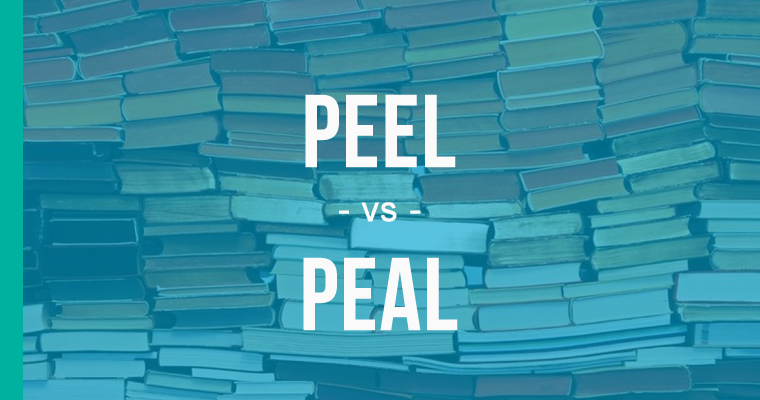Peel vs. Peal – How to Use Each Correctly

What is the Difference Between Peel and Peal?
Contents
Peel and peal are two English homophones, which means they are words that sound the same when spoken but have different meanings.
Sometimes, homophones are different parts of speech, but today’s words have the same functions within a sentence: they both function as nouns and verbs.
Peel has to do with the outer covering of a fruit or vegetable.
- Can you peel these carrots and put them in the stew?
Peal has to do with a loud ringing of bells or laughter.
- The church bells pealed for the entire town to hear.
Now, let’s go over the specific ways each of these words are used.
Using Peel in a Sentence
When to use peel: Peel is used when referring to the outer skin of a fruit or vegetable. In this sense, it can be a noun or a verb.
For example,
- What should I do with these lemon peels? (Noun)
- After you peel the banana, cut it up and place it with the other fruit. (Verb)
If you peel an apple or another kind of fruit, you are removing its outer peel.
Phrases That Use Peel
There are a number of phrases formed using the word peel, including,
Keep your eyes peeled: Stay alert and be conscious of your surroundings.
- If you keep your eyes peeled, you can see celebrities walking around here.
Peel out: To leave in a hurry, especially in a car when the tires are spinning.
- Once I saw a fight break out, I peeled out of there to avoid any trouble.
Chemical peel: a technique used to improve skin quality.
- I went to get a chemical peel yesterday, and now my face is glowing.
Using Peal in a Sentence
When to use peal: Peal can also function as a noun or a verb. It refers to a loud ringing sound, specifically the sound of bells or laughter.
For example,
- After the joke, the table burst into peals of laughter. (Noun)
- On New Year’s Day, the city bells peal at midnight. (Verb)
As you might imagine, peal is much less common than peel in writing and in everyday speech. Most people eat fruits and vegetables on a daily basis, so peel is much more likely than peal to make it into someone’s daily vocabulary.
Even so, there are a few common phrases that use the word peal.
Phrases That Use Peal
Peals of thunder/Peals of laughter: A loud, repeating or reverberating sound of thunder or laughter.
- During the storm last night, there were peals of thunder for hours.
Remembering Peel vs. Peal
What’s an easy way to keep track of these two words? Since they are both the same parts of speech, you will need to use the context of your sentence to know which to use.
Luckily, there is an easy way to remember. Vegetable and peel both have extra “e’s” in them. Vegetable has three, and peel has two. Since a peel is found on vegetables, this is a great way to remember which word is which.
Outside Examples
- There will be a new tone to the pealing of church bells over Easter weekend in downtown Naperville. –Chicago Daily Herald
- St Peter Mancroft Church boasts a peal board which is the earliest known record of a “full peal” which was successfully completed by its ringers in 1715. –Norfolk Eastern Daily Press
- The man accused of throwing a banana peel at comedian Dave Chappelle during a New Mexico performance is headed to court. –Billboard
- The results also suggest that while all fruit has some level of flavanoids, few can compare with the effectiveness of the peel of an apple, the research suggests. –The Telegraph
Quiz: Peel vs. Peal
- The ______ of an apple is its most nutritious part.
- How do you ______ your banana?
- His laugh is loud and ______ all around the restaurant.
Article Summary
Should I use peel or peal? These two homophones sound the same when spoken, but they are never interchangeable.
- A peel is the skin of a fruit or vegetable.
- A peal is a loud sound of repeated or reverberating ringing (bells) or laughter.
Quiz Answers
- Peel.
- Peel.
- Peal.
